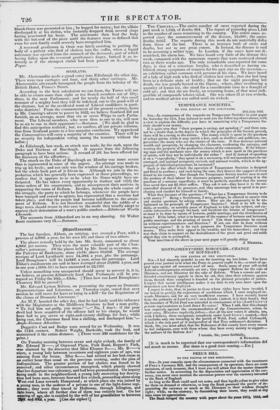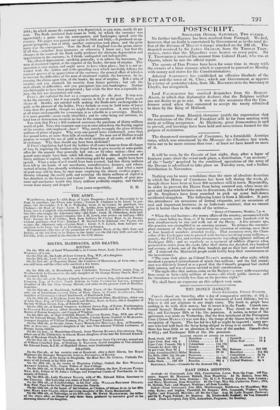PEEL'S BILL
TO THE EDITOR OF THE SPECTATOR.
Sra--In your remarks upon the circumstances connected with the enactment of PEEL'S Currency Bill, and the consequences of its operation, there are some omissions, of such moment, that I trust you will admit that the matter demands further notice. In accounting for the depreciation and appreciation of the cur- rency, you never once mention the enormous powers over the currency intrusted to the Stank of England.
As long as the Bank could send out notes, and then legally refuse to give value for them on demand or otherwise, so long the Bank possessed the power of de.. preciating the currency as much as the Directors in their wisdom thought right; while, on the contrary, by diminishing their issues, they could at any time cause its appreciation.
The Bank deluged the country with paper about the years 1812, 1818,101.. 1814' by which means tha currency was depreciated, as you state, nearly 25 per cent. The Bank restricted their issues m 1816, by which the currency was appreciated ; a panic was the consequence, and 'bankruptcy spread over the country. The paper was poured out again in 1824 and 1825,—it produced an ap- parent-prosperity ; but in 1826, another contraction took place, and the great panic was the consequence. Now the Bank of England was the prime mover of all this _whether from ignorance or otherwise I know not ; but that the changes in the issues of the Bank really produced the alternate depreciation and appreciation in the currency, is, I think, undisputed and indisputable.
The effect of depreciation, speaking generally, is to relieve the borrower, the man of straitened capital, at the expense of the lender, the man of surplus. This opera
tion is very unjust, and ought never to have taken place ; but it is not at- tended with the sudden and wide-spreading ruin which inevitably follows the contrary process of an appreciation of the currency, the general effect of which is to increase the difficulties of the man of straitened capital, the borrower, by in-. creasing the claims upon him, of the lender, the man of surplus. Rob a man of surplus, and you diminish his security from future poverty ; but rob the man already in difficulties, and you precipitate him into bankruptcy. Neither mischief ought to have been perpetrated ; but while the first was a reparable in- jurv, the last was devastation and ruin.' Peet's Act inflicted the last as a compensation for the first. It was wise to fix the currency ; but it was cruelly unwise to fix it at the point PEEL made choice of. Besides, not satisfied with making the Bank-note exchangeable for gold, at the pleasure of the holder, PEEL forbade us even to hold notes of lower value than five pounds, though we might desire it ourselves. A note which is at all times exchangeable for a sovereign, is as valuable as a sovereign. Besides, it is more portable—more easily identified ; and its value being not intrinsic, its total loss or destruction involves no loss to the community. You state that PEEL'S Bill rendered necessary the purchase of thirty millions worth of gold. Now, this immense sum was at once taken from the floating capital of the country, and employed—how? Why, merely to supply the place of thirty million* of pieces of paper. Why were one-pound notes condemned, more than five-pound notes, or more than bills of exchange? No man out of Bedlam would propose to compel the use of gold to the total abolition of all notes, and all bills of exchange. Why then should any have been abolished ? If PEEL'S legislation had freed the holders of all notes whatever from all chance of loss, by requiring the bankers who issued them to give security at some public office for the amount they generally had out—or by other means—then one- pound notes might have been safely left alone, and this absurd investment of thirty millions of capital, sunk in substituting gold for paper, might have been spared. What a mass of evil would have been averted, had this thirty millions been left in the hands of our merchants, manufacturers, farmers, and others, instead of being thus absurdly withdrawn from their hands! And what a mass of good may still be done, by once more employing the almost costless paper-- thereby releasing the costly gold, and restoring the thirty millions of capital it has absorbed, to the farmers and trailers! How many thousands of poor pea- sants and mechanics would this thirty millions profitably employ, and thereby rescue from misery and despair !
I am yours respectfully, E. H.




























 Previous page
Previous page